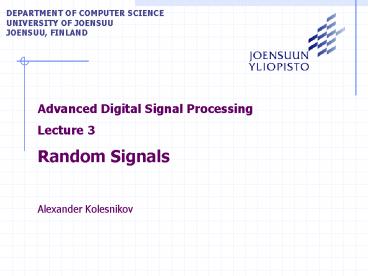Advanced Digital Signal Processing - PowerPoint PPT Presentation
1 / 21
Title:
Advanced Digital Signal Processing
Description:
Process is ergodic if the time average is equal to. ensemble average: We can calculate statistical characteristic of a ergodic. random signal from one sample signal. ... – PowerPoint PPT presentation
Number of Views:1376
Avg rating:3.0/5.0
Title: Advanced Digital Signal Processing
1
DEPARTMENT OF COMPUTER SCIENCE UNIVERSITY OF
JOENSUU JOENSUU, FINLAND
- Advanced Digital Signal Processing
- Lecture 3
- Random Signals
- Alexander Kolesnikov
2
Random signal
Random (stochastic) process a collection of
random variables ?(k)(t), t?T, which is a
function of time. For each t, ?(k)(t) is a
random variable. (t is usually referred as time)
3
Time
- Process with a discrete time (random sequence)
- Process with continuous time.
4
Distribution function (1)
5
Distribution function (2)
6
Distribution function (n)
...
7
Independence
8
Moment functions
1st moment (mean value)
2nd central moment (variance)
9
Moment functions
2nd mixed moment
10
Stationarity in strict sense
1)
2)
11
Stationarity in wide sense
Stationarity in strict sense
Stationarity in wide sense
Stationarity in wide sense
Stationarity in strict sense
Guassian random signal is stationary in strict
sense if it is stationary in wide sense.
12
Average for ensemble
- An ensemble average
13
Time average
- Long-term time average
T
14
Ergodicity
Process is ergodic if the time average is equal
to ensemble average
We can calculate statistical characteristic of a
ergodic random signal from one sample signal.
15
Classification of processes
Non-stationary processes
16
Correlation function Examples
1) Noise
2) Quasi-deterministic signal
If pdf for phase ? is uniform in ,
then the random process is stationary in strict
sense, otherwise it is stationary in wide sense.
3) Telegraph signal
17
Periodogram
Fourier transform of the truncated signal
The limit does not exist!
The variance of is positive when
18
Power spectrum (or spectrum)
19
Wiener -Khinchine Theorem
20
Spectrum Examples
1) White noise
2) Quasi-deterministic signal
3) Telegraph signal
21
Uncertainty principle































